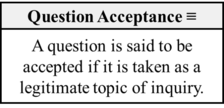Question Acceptance
What does it mean to say that a question is accepted? How should question acceptance be defined?
In the scientonomic context, this term was first used by William Rawleigh in 2018. The term is currently accepted by Scientonomy community.
In Scientonomy, the accepted definition of the term is:
- A question is said to be accepted if it is taken as a legitimate topic of inquiry.
Contents
Scientonomic History
Acceptance Record
| Community | Accepted From | Acceptance Indicators | Still Accepted | Accepted Until | Rejection Indicators |
|---|---|---|---|---|---|
| Scientonomy | 12 May 2018 | This is when Rawleigh's The Status of Questions in the Ontology of Scientific Change that offered a definition of question acceptance was published. This is a good indication that the question of how the term is to be defined is considered legitimate by the community. | Yes |
All Theories
| Theory | Formulation | Formulated In |
|---|---|---|
| Question Acceptance (Rawleigh-2018) | A question is said to be accepted if it is taken as a legitimate topic of inquiry. | 2018 |
Accepted Theories
| Community | Theory | Accepted From | Accepted Until |
|---|---|---|---|
| Scientonomy | Question Acceptance (Rawleigh-2018) | 1 November 2018 |
Suggested Modifications
| Modification | Community | Date Suggested | Summary | Verdict | Verdict Rationale | Date Assessed |
|---|---|---|---|---|---|---|
| Sciento-2018-0003 | Scientonomy | 12 May 2018 | Accept that the epistemic stance that can be taken by an epistemic agent towards a question is question acceptance (the opposite is unacceptance), where question acceptance is defined as "a question is said to be accepted if it is taken as a legitimate topic of inquiry". | Accepted | It was noted that "the whole point of adding questions to the ontology of epistemic elements was that we can legitimately speak of a question being accepted by a certain agent at a certain time".c1 The discussion also revealed a need to distinguish "a situation where no consensus exists from a situation where a consensus exists that a question is illegitimate".c2 In other words, "just as question acceptance, theory acceptance too seems to allow for three values: (clearly) accepted; (clearly) unaccepted; no consensus".c3 Thus, a new question was suggested concerning the binary character of epistemic stances: "are all epistemic stances binary, or do they allow for more than two values?"c4 | 1 November 2018 |
Current Definition
In Scientonomy, the accepted definition of the term is Question Acceptance (Rawleigh-2018).
Question Acceptance (Rawleigh-2018) states: "A question is said to be accepted if it is taken as a legitimate topic of inquiry."
Question Acceptance refers to one of the two stances that epistemic communities can take towards questions, with the opposite stance being unacceptance. A question is said to be accepted by an epistemic community if and only if said epistemic community takes the question to be a legitimate topic of inquiry.
Ontology
Existence
In Scientonomy, it is currently accepted that "There is such a thing as question acceptance."
Disjointness
In Scientonomy, no classes are currently accepted as disjoint with Question Acceptance.
Subtypes
In Scientonomy, there are currently no accepted subtypes of Question Acceptance.
Supertypes
In Scientonomy, the following supertype of Question Acceptance is currently accepted:
Associations
In Scientonomy, there are currently no accepted associations of Question Acceptance.
If a question concerning the ontology of question acceptance is missing, please add it here.
Dynamics
Mechanism of Question Acceptance
The question has no accepted answer.
If a question concerning the dynamics of question acceptance is missing, please add it here.
Related Topics
This term is also related to the following topic(s):
